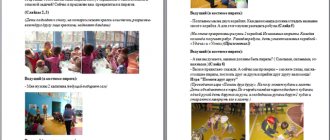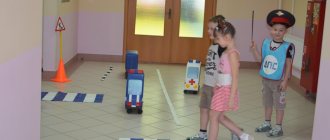Competitive life safety program for primary school students, grades 2-3
Competitive program for junior schoolchildren “Staying Alive”
Author : Olga Valentinovna Sheiko, methodologist of the State Educational Institution “Slutsk Central Children’s Theater” Description: The competitive program “Staying Alive” systematizes students’ knowledge of the basics of safe life in a playful way. Can be used in the work of a class teacher, additional education teacher, or children's camp teacher. Age of participants: 8-12 years, number of 20-30 people. The goal is to consolidate knowledge on the basics of safe life and develop skills of self-preservation behavior. Objectives: - remind students of the basic rules of safe behavior in various situations; - cultivate a responsible attitude towards your life, your safety; — practice skills of possible behavior in emergency situations. Equipment:
cards with emergency phone numbers, telephone set (toy or real), 6 empty medicine bottles.
Progress of the event: (Before the start of the game, participants are given red and yellow tokens) 1. Opening speech by the presenter: It was difficult for a person to live in ancient times: he was surrounded by wild nature, there were no telephones, cars, factories... But with the advent of all this, new dangers arose. Every day on radio, television, in newspapers, and on the Internet we see reports of accidents, catastrophes, and natural disasters in one or another corner of the globe. Emergency situations that arise in our time require emergency measures to eliminate their consequences. But it is better to prevent trouble than to fight it or reap its fruits. And today we will try to learn how to act correctly in such situations, we will learn to prevent them!
Now we will divide into teams (according to the color of the tokens): the yellow team and the red team. Teams come up with names and mottos within 5 minutes. For example: team “Ogonki”, motto: “Always shine, shine everywhere!” 2. Team presentations. 3. Quiz competition “Personal Security”.
Teams compete to see who can answer a quiz question correctly first. For each correct answer, the team receives a “light”. Answers to some questions are discussed with the presenter, since different options are possible, depending on the situation. The presenter also gives explanations regarding the children’s incorrect answers. Questions:
1.What will you do if you get lost in a big city, store, etc.?
- you will look for parents yourself; - seek help from adults; - advertise. 2.If a stranger treats you to candy on the street, what will you do? - refuse the treat; - take it and run away; - take it and eat it quickly. 3.If you see a package left by someone on a transport, what will you do? - take it for yourself; - give it to a friend - tell the inspector or driver. 4.If someone is following you on the street, what will you do? - stop and sing “We are not afraid of the gray wolf”; - run to a crowded place and ask an adult or police officer for help; - run towards him shouting “I’ll gore you.” 5. Continue the phrase “If you are invited to swim, appear on TV, promise to give you candy, answer firmly...” - yes; - No; - I'll think about it. 6.If someone is drowning before your eyes, what will you do? - wave your hand at him; - call adults for help; - try to save it yourself. 7.If a dog approaches you without a leash or muzzle, what will you do? - run quickly; - shout “Fas!”; - remain standing in place and command the dog to “Stop!” 8.What should you do if your nose starts bleeding? - lean forward a little, hold your nose and raise your other hand up; - shout “Mommy, help!” as loudly as possible; - Call an ambulance immediately. 9. A speck has gotten into your eye, you... - shake your head vigorously; - rinse with boiled water; - wait until it goes away on its own. 10.You spilled hot tea on yourself, what should you do first? - place the burned area under running cold water; - grease with oil; - grease with brilliant green. 11. While walking, your fingers stung from the cold, what will you do? - rub it with snow; - take a hot shower; - give a light massage. 12.What grave mistake did Little Red Riding Hood’s grandmother make? — opened the door to a stranger; — they didn’t offer the Wolf tea; 4. Competition "Magic numbers"
Each team receives cards with special call phone numbers: 101, 102, 103, 104, the knowledge of which is necessary for everyone - adults and children. The guys must sign next to each number the name of the emergency service (fire service, police, ambulance, emergency gas service). 5. Competition “Don’t joke with fire!”
The teams, after consulting for one minute, name the possible causes of the fire: who is greater. 6 Competition “SOS!”
The teams take turns being given a toy phone, which they need to call and ask for help (for example, the fire department, police or gas service). In order for the service employees to get there faster, it is necessary to clearly and quickly state the address, last name, and reason for the call. 7. Competition “We stew it ourselves”
Host: We have already called the firefighters, but we ourselves cannot remain inactive. What to do next? Each team is asked one question: 1. How can you extinguish burning gasoline, kerosene and other organic oils? (Foam fire extinguisher, sand, earth, heavy wet cloth). 2.If your clothes caught fire, what should you do? (You need to wrap yourself in fabric to prevent oxygen from flowing in or roll on the ground trying to put out the flames). 3.What should you do if the room you are in begins to fill with thick, acrid smoke? (Cover your mouth and nose with a wet rag and, crouching, move towards the exit). 8. Competition “Beware of the bus!”
Host: You need to be careful on the street where there are a lot of vehicles. But you must behave no less carefully inside the vehicle itself. Teams need to prove why they can’t: — jump on a bus while it’s moving; - run along it while it is moving; - make noise, talk loudly on the bus; - lean out of the bus window. 9. Competition “Aibolit” Teams receive empty bottles with labels: - “internal”; - “external”; - “intramuscular”; - “intravenously”; — “do not spray near open flames”; - “Keep out of contact with eyes.” The labels need to be explained. 10. Competition “My home is my fortress”
Presenter: “My home is my fortress,” that’s what our ancestors said. But a burglar may break into the house. What if the child is alone at home, like the hero of a famous film? The task is to arrange the following actions in the required sequence: - I will try to better remember the signs of the criminal; - I will try to attract the attention of neighbors and passers-by by shouting through the window and knocking on the walls; — I’ll try to block the door with furniture; - I'll call the police. Host: We finish our game and wish our participants to act in life as amicably and thoughtfully as in the game. Remember: your safety is in your hands! 11. Rewarding participants.
We recommend watching:
Summary of the travel game “Lessons of Caution” for older preschoolers Games in decorative drawing lessons, grades 3 - 4 Entertainment and game program for younger schoolchildren Didactic game on life safety for children 5-7 years old
Similar articles:
Competitions and games for March 8th for children
Games for developing children's attention
Educational games for preschool and primary school children
Games for developing imagination from 4 to 10 years
Game program for primary schoolchildren


